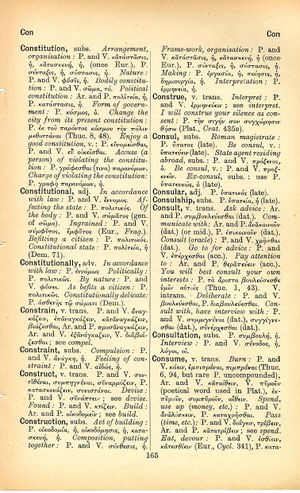constitutional: Difference between revisions
From LSJ
Πάντα οὖν ὅσα ἐὰν θέλητε ἵνα ποιῶσιν ὑμῖν οἱ ἄνθρωποι, οὕτως καὶ ὑμεῖς ποιεῖτε αὐτοῖς· οὗτος γάρ ἐστιν ὁ νόμος καὶ οἱ προφῆται → Therefore as many things as you would like people to do for you, do also the same for them: that is the Torah, that is the prophets! (Matthew 7:12)
(CSV3) |
m (Text replacement - "<b class="b2">Frag.</b>" to "''Frag.''") |
||
| Line 8: | Line 8: | ||
<b class="b2">Of the body</b>: P. and V. σώματος (gen. of [[σῶμα]]). | <b class="b2">Of the body</b>: P. and V. σώματος (gen. of [[σῶμα]]). | ||
<b class="b2">Ingrained</b>: P. and V. [[σύμφυτος]], [[ἔμφυτος]] (Eur., | <b class="b2">Ingrained</b>: P. and V. [[σύμφυτος]], [[ἔμφυτος]] (Eur., ''Frag.''). | ||
<b class="b2">Befitting a citizen</b>: P. [[πολιτικός]]. | <b class="b2">Befitting a citizen</b>: P. [[πολιτικός]]. | ||

